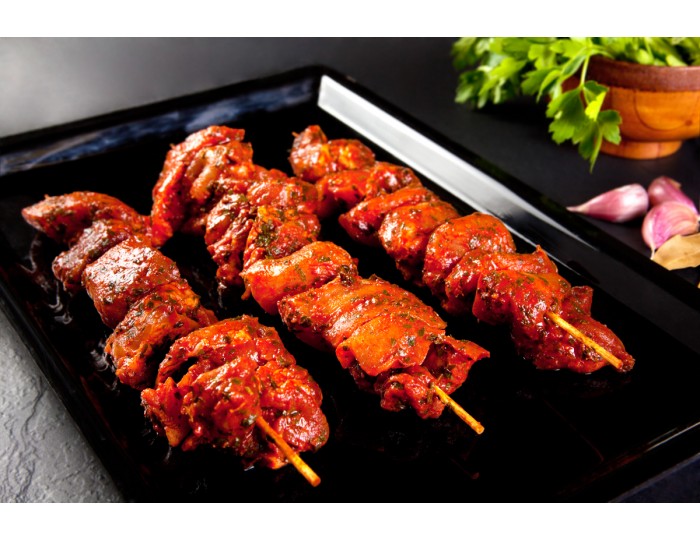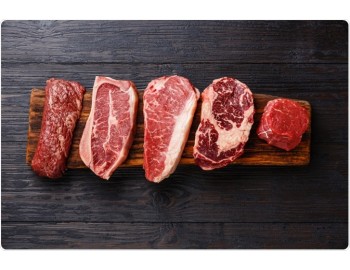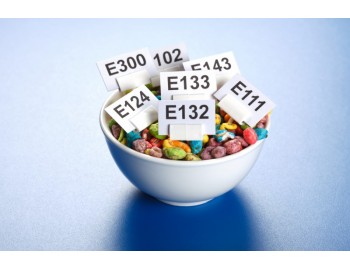Yeni "Bullfight Premium" Del'Ar marinaade

Əlaqədar yazı
Bir texnoloqun sirri - Ət məhsulları üçün ləzzət düzəldicisi
Soyuzsnab Şirkətlər Qrupu, ət məhsullarında istənilən arzuolunmaz ləzzəti effektiv şəkildə aradan qaldıran Del’Ar® Kompleks Qida Əlavəsi 10.07.703 M dad düzəldicisini hazırlamışdır. Səmərəliliyin geniş tətbiqi var - bütün növ kolbasa, dondurulmuş və soyudulmuş yarımfabrikat məhsullarında istifadə edilə bilər. Aşqarın özünəməxsusluğu, bənzər aşqarlardan fərqli olaraq əsas ləzzət istiqamətini əlavə etməməsi və təhrif etməməsidir.
Şirkətin tərtibatçıları düzəldicinin tərkibini seçdilər ki, məhsula daxil olduqda məhsulun profilinə təsir göstərməsin. Yeniliyin əsas komponenti kərəviz oleoresindir. Bu bitki güclü bir aroma və şirin-acı ədviyyatlı bir dadı var, otlar ilə yaxşı gedir və xam ətin istenmeyen profilini mükəmməl şəkildə düzəldir.
Müxtəlif kateqoriyalı ət xammalı üzərindəki yeni maddələrin effektivliyi
Ət məhsullarının dəyərini azaltmaq üçün bitki mənşəli zülallar, nişasta, un, müxtəlif protein-yağ emulsiyaları (BJE), donuz dərisindən emulsiyalar istifadə olunur. Bütün bu xammallar hazır məhsulun dad xüsusiyyətlərini azaltmağa meyllidir. Dad düzəldicisi, bu komponentlərin verdiyi hər ləzzətin təsirini aradan qaldırır.
Bundan əlavə, ləzzət düzəldicisi 07/10/0703 M, ətin bəzi növlərinə xas olan ləzzəti yaxşıca bağlayır, məsələn, quzu və hinduşka. Bu növ xammalın yüksək qida dəyərinə baxmayaraq, spesifik ləzzətləri dəf edə bilər. Düzəldərək korrektor kolbasa və yarımfabrikat məhsullarını "təmiz" ləzzətlə istehsal etməyə imkan verir və bununla da istehlakçıların dairəsini genişləndirir və istehsalçılara iqtisadi fayda təmin edir.
Ləzzət düzəldicisinin 10.07.703 M-də tətbiq olunduğu xammalın ləzzətlərini düzəldərək "köməkçi" təsirə malik olduğuna əsaslanaraq, maddələr əlavə etmə ardıcıllığı vacibdir. Ət əlavə edərkən əsas aromatı əlavə etmədən əvvəl yeniliyi birbaşa kəsiciyə və ya ət qarışdırıcısına tökmək məsləhət görülür. Sonra, kütlə boyunca bərabər paylanmış şəkildə verməlisiniz. Optimal doz: 1 kq qiymə ətinə 5-7 qram. Yalnız bundan sonra ləzzət verən aşqar əlavə edilməlidir. Beləliklə, bitmiş məhsul kənar ləzzət olmadan verilən bir əsas dad və aroma sahib olacaqdır.
"İnteqrasiya edilmiş Qida Əlavəsi 10.07.703 M" Del'Ar® Rusiyadakı ət emalı müəssisələrində özünü sübut etdi.
Mütəxəssis rəyi
Alexey Tolmachev, GT SOYUZSNAB Ət Texnologları
“Müştərilərdən biri hinduşka ətindən hazırlanmış kolbasa tərkibindəki xüsusi ləzzəti düzəldə bilən maddələr seçmək problemi ilə bizə müraciət etdi. Holdinqin mütəxəssisləri məhsuldarlıq problemini 10.07.703 M. həll etməyi təklif etdi. Bu, tamamilə türk ətindən ibarət məhsulların tərkibində də işləyir. Şirkət texnoloqları aşqarın istifadəsinin asanlığını və reseptin istehsalata təqdim olunduğu hazır məhsulun əla dadını qeyd etdilər. ”
Qidalanma əlavələsi nədir və hansılardır?
Qidalanma əlavələri, lazımi xüsusiyyətləri vermək üçün qida məhsullarına əlavə olunan xüsusi maddələrdir.
Qida əlavələri məhsula emal, istehsal, saxlama, qablaşdırma və daşınma mərhələlərində gətirilir.
Bir qida əlavəsini bir məhsula təqdim etmək məqsədləri ola bilər:
- dad və ya ətir almaq;
- rəngləmə;
- ardıcıllığın formalaşması;
- raf ömrünü artırmaq.
İstifadənin rahatlığı üçün, bütün qida əlavələrinin "E" hərfi ilə başlayan (Avropa Birliyinin təsnifatına görə) özünəməxsus nömrəsi var. Qida əlavələrinin təsnifatı statik bir fenomen deyil. Siyahıya müntəzəm olaraq yeni qidalanma əlavələri əlavə olunur, bəziləri icazə veriləndən qadağan və əksinə hərəkət edir. Bundan əlavə, bu cür siyahılar ölkədən fərqli ola bilər.
İnsan bədəninə zərər verməyən təbii əlavələr var.
Təbii qida əlavələri
Bu qida əlavələri qrupuna təbiətdə olan və insan sağlamlığına zərər verməyən maddələr daxildir. Bu əlavələrin mənşəyi bitki, heyvan, mineral ola bilər. Yalnız "bir bağdan" və "öz inəyindən" məhsullarını yeyərkən belə qidalı qidalar bədənimizə daxil olur və nəinki zərər vermir, həm də sağlamlığımıza müsbət təsir göstərir.
Təbii qida əlavələrinin nümunələri:
E100 - curcumin, zerdeçal bitkisindən əldə edilən rəngləmə maddəsi;
E406 - yosundan bir jel agenti (bəzi şirniyyat və marmeladın bir hissəsi);
E414 - bəzi ağaclardan alınan saqqız ərəb;
E160c - adından göründüyü kimi paprika yağ qatranları paprika və s.
Süni əlavələr
Süni şəkildə hazırlanmış təbii əlavələr olan aşqarlar var. Yəni bu cür maddələr təbiətdə olur, lakin sənaye məqsədləri üçün süni şəkildə əldə edilir. Bu cür əlavələr orqanizm üçün də etibarlıdır, lakin artıq bir "ancaq" var: onların hazırlanması zamanı əlavə məhsullar, metal qarışıqlar və s. Maddəyə daxil ola bilər. Bu qrupdan olan qida əlavələri çox vaxt "təbii ilə eynidır" adlanır.
Misal üçün:
E300 gündəlik istifadə üçün bir çox həkim tərəfindən tövsiyə edilən askorbin turşusudur. Sənaye məqsədləri üçün qlükozadan askorbin turşusu (C vitamini) alınır.
E160a - karotenlər, parlaq yerkökülərdən məlum olan bütün faydalı maddələr. Sənayedə karotenlər ya təbii məhsullardan çıxarılmaqla və ya kimyəvi üsulla minalanır.
E296 - insan orqanizmində normal şəkildə sintez olunan malic turşusu. Kimyəvi olaraq molik turşusu əldə edilir.
E153 - bitki kömürü, qalıq maddədir. Çox vaxt bitki materiallarının karbonlaşması ilə əldə edilir.
E260 ən çox yayılmış sirkədir.
Tamamilə sintetik qidalanma əlavələri
Bu qrupun qida əlavələri təbiətdə tapılmır, insan orqanizmində istehsal olunmur və buna görə daha yaxından diqqət tələb olunur. Sintetik aşqarların bəziləri zəif başa düşülür, bəziləri allergik reaksiyaların riskini, hipertansiyonun, həzm sisteminin pozğunluğunu və bədxassəli şişlərin meydana gəlməsini əhəmiyyətli dərəcədə artırır.
Qida əlavələrində qida əlavələrinin istifadəsinin məqsədəuyğunluğu müəyyənləşdirilərkən, adətən qadağan olunmuş və icazəsiz qida əlavələrinin siyahılarına diqqət yetirilir.
Qadağan edilmiş əlavələr insan orqanizminə mənfi təsiri sübut olunmuş maddələrdir. İcazəsiz aşqarlar, məlumatları hələ yetərli olmayan və ya araşdırmalar hələ tamamlanmamış maddələrə daxildir.
Qadağan edilmiş qida əlavələri.
Ümumi Junk Qida əlavələrinin nümunələri
E250 - natrium nitrit. Sənaye kolbasalarının ənənəvi bir komponentidir. Natrium nitritinin insanlar və məməlilər üçün təhlükəli bir zəhər olmasına baxmayaraq, kolbasa istehsalında fəal istifadə olunur, lakin onun dozası olduqca azdır və buna görə də təhlükəli deyil. Bir mağazada kolbasa alarkən, hisə verilmiş kolbasa üçün natrium nitritin icazə verilən dozasının bişmiş kolbasa üçün eyni göstəricidən çox olduğunu xatırlamaq lazımdır, çünki hisə verilmiş ət bayram məhsulu hesab olunur, daha az istifadə olunan ləzzətdir.
E951 - aspartam. Aspartame, bir çox qazlı şəkərli içki içərisində məşhur bir tatlandırıcıdır. İnsan orqanizmində bir dəfə aspartam fenilalanin, aspartik turşu və metanola - məlum zəhərli spirtə parçalanır. 5-10 ml dozası korluğun mümkün inkişafı ilə ağır zəhərlənməyə səbəb olur və 30 ml artıq öldürücü bir dozadır. Əlbəttə ki, aspartam ilə hətta bir şüşə soda içdikdən sonra insan hələ də metanol zəhərlənməsindən uzaq olacaq, lakin bu cür içkilərin istifadəsini məhdudlaşdırmaq olduqca məqbuldur.
E338 - fosfor turşusu. Aşağı kalorili Coca-Cola və digər içkilərin bir hissəsidir. Turşu və yüngül acı bir dad vermək üçün məhsullara əlavə olunur. Bu qida əlavəsi sümük gücünü azaltmağa kömək edir və diş emalını məhv edir.
E952 - natrium siklamat. Şirin karbonatlı salfetlərdə istifadə olunan şirniyyat


